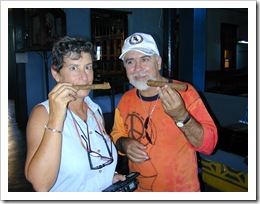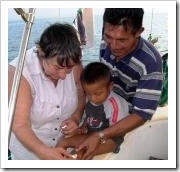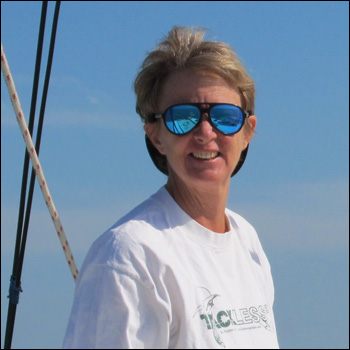 Bonjour, hola, buenos dias, malo lei lei, bula, g’day…..these are ways to “hello” from the Caribbean to Australia. Tackling foreign languages can be scary. There are the pitfalls of pronunciation, the embarrassments of using a wrong word, the confusion of word order, the mysteries of gender, and the maze of myriad verb tenses. But the goal for most cruisers is not to be fluent. The goal is to be understood. The rewards accruing to even the smallest effort are tremendous.
Bonjour, hola, buenos dias, malo lei lei, bula, g’day…..these are ways to “hello” from the Caribbean to Australia. Tackling foreign languages can be scary. There are the pitfalls of pronunciation, the embarrassments of using a wrong word, the confusion of word order, the mysteries of gender, and the maze of myriad verb tenses. But the goal for most cruisers is not to be fluent. The goal is to be understood. The rewards accruing to even the smallest effort are tremendous.
“Making an attempt to learn the language of my host country is as important as finding out what kind of provisioning is available or whether or not they have fuel and internet,” says Marcie of Nine of Cups. “How better to learn about a culture than to talk with its natives? I work hard to learn at least the basics.”
 There are hundreds of languages throughout the world, and in some regions there can be dozens in the same island group. Fortunately for cruisers, most of these areas also have adopted one of the three major international languages: English, French or Spanish. Most of us had classes in school in one or the other. Had we known back then we were going to grow up to be international travelers, we’d probably have applied ourselves more diligently. But, it is amazing what sticks! Even the most indifferent students are surprised by what they can resurrect given a little real-life stimulation. “Dos cervezas frías, por favor,” for example!
There are hundreds of languages throughout the world, and in some regions there can be dozens in the same island group. Fortunately for cruisers, most of these areas also have adopted one of the three major international languages: English, French or Spanish. Most of us had classes in school in one or the other. Had we known back then we were going to grow up to be international travelers, we’d probably have applied ourselves more diligently. But, it is amazing what sticks! Even the most indifferent students are surprised by what they can resurrect given a little real-life stimulation. “Dos cervezas frías, por favor,” for example!
“When I was taking Spanish classes in 7th and 8th grade,” says Mary of Camryka, “who would have guessed I’d be chatting one day with a fellow on a bus in Guatemala or bargaining for a better price on shrimp in Venezuela?”
 Today’s cruisers are very lucky. In additional to all the primers, language programs and Lonely Planet phrase books, we have Kathy Parsons’ Spanish for Cruisers and French for Cruisers (www.forcruisers.com). Most all the Admirals cited them as indispensable, and I would agree. I don’t say this because Kathy is a friend and collaborating Admiral. It’s more that Kathy became a friend and collaborating Admiral BECAUSE of my admiration for her work. What makes her books so special is that she gives us strategies for jumping right in, for making the most of what little we may have, and then she provides the vocabulary that applies to our very particular lifestyle, words that are rarely in regular dictionaries and certainly not in tourist phrase books.
Today’s cruisers are very lucky. In additional to all the primers, language programs and Lonely Planet phrase books, we have Kathy Parsons’ Spanish for Cruisers and French for Cruisers (www.forcruisers.com). Most all the Admirals cited them as indispensable, and I would agree. I don’t say this because Kathy is a friend and collaborating Admiral. It’s more that Kathy became a friend and collaborating Admiral BECAUSE of my admiration for her work. What makes her books so special is that she gives us strategies for jumping right in, for making the most of what little we may have, and then she provides the vocabulary that applies to our very particular lifestyle, words that are rarely in regular dictionaries and certainly not in tourist phrase books.  “I was astounded when a cruiser told me she didn’t need Spanish for Cruisers because she’d just bought Rosetta Stone (a language teaching program),” says Ellen of Cayenne. “I can only hope she doesn’t need an emergency stuffing box, propeller shaft, mainsail, or body part repair in Colombia!”
“I was astounded when a cruiser told me she didn’t need Spanish for Cruisers because she’d just bought Rosetta Stone (a language teaching program),” says Ellen of Cayenne. “I can only hope she doesn’t need an emergency stuffing box, propeller shaft, mainsail, or body part repair in Colombia!”
“To get started on cruiser Spanish or French,” advises Kathy, “concentrate first on these key areas:
1. Pronunciation, so people can understand you, but also so you can cheat by pronouncing English words with a Spanish or French accent (You’ll be amazed how often that works!)
2. Basic greetings and courtesy phrases, so that you don’t come off rude or abrupt; and
3. Key words or sentences for the need at hand jotted on an index card as prompts.
 “Then, create a little spiel about yourself that you can memorize and use as an ice-breaker: ‘Hi, my name is Kathy. This is my partner Bill. We sailed here from the US on our boat,” etc.”
“Then, create a little spiel about yourself that you can memorize and use as an ice-breaker: ‘Hi, my name is Kathy. This is my partner Bill. We sailed here from the US on our boat,” etc.”
Next get off the boat and start talking with people, including children, who several Admirals mention make particularly good teachers! Ask directions, point to things and ask their names, use pantomime, show your notes, draw.
“If you don’t know the name of something,’ says Mary, “play a version of 20 questions with the words you do know: ‘It comes in a can; you put it on wood to kill insects; it smells bad.’ Locals make Herculean attempts to figure out what we’re trying to say regardless of our ridiculous verb tenses, masculine-feminine confusion, or adjective-noun mix-ups.<”
 Both “For Cruisers” books include diagrams and pictures; lay out the book and point to what you need. This is particularly useful when your partner has sent you ashore to buy some obscure part for the engine or rigging, especially if you are not too sure what it’s called in English! But the books go way beyond the engine room. You’ll find sections on grocery products, banking, medical, internet etc. Just wait ‘til you try to decipher cuts of meat without it!
Both “For Cruisers” books include diagrams and pictures; lay out the book and point to what you need. This is particularly useful when your partner has sent you ashore to buy some obscure part for the engine or rigging, especially if you are not too sure what it’s called in English! But the books go way beyond the engine room. You’ll find sections on grocery products, banking, medical, internet etc. Just wait ‘til you try to decipher cuts of meat without it!
“Whatever the subject, don’t take yourself too seriously,” stresses Kathy. “Get out there and make mistakes. Your mission is to amuse the locals with your attempts to speak their language. When you make people laugh, you remember, you seldom create the same mistake twice, and you wouldn’t believe how much it pleases the locals when you demonstrate an interest in their language and culture, no matter how UGGGGLY your efforts! It gives them a nice way to help you. And, while they teach you how to pronounce things correctly, teach them the English word back.”
 The natures of different culture groups will make this process easier or harder. Spanish speakers for the most part are incredibly gracious and welcoming and will readily work with you even if you speak no Spanish. Because of this easy manner, many cruisers settle in long-term, but also because of it, they can get lazy about language. What kind of message do we give if we spend years in their country without ever progressing past those dos cervezas?
The natures of different culture groups will make this process easier or harder. Spanish speakers for the most part are incredibly gracious and welcoming and will readily work with you even if you speak no Spanish. Because of this easy manner, many cruisers settle in long-term, but also because of it, they can get lazy about language. What kind of message do we give if we spend years in their country without ever progressing past those dos cervezas?
French speakers are perceived as more aloof and critical, but this impression stems from a cultural emphasis put on language, which means they are correspondingly anxious about their own efforts at speaking English. Once you make a valiant effort to speak some French to shop keepers or French cruisers, doors that seem firmly closed will eventually open.
 Another way that many cruisers choose to help improve their language skills is to take a language course. Sometimes these are found as close as the marina dock, like the Spanish lessons I took in Mazatlan or Marcie took in Cartagena. Alternatively they can be combined with exciting inland trips, like popular immersion courses in Antigua, Guatemala or San Miguel de Allende, Mexico. For French lessons, the Alliance Française maintains chapters dedicated to promoting the French language and francophone culture all over the world. Once started, you’ll find myriad ways to expand your skills: listening to popular songs, scanning newspapers, and reading subtitles on American movies. My habit has been to read, pronounce and comprehend every street sign I pass!
Another way that many cruisers choose to help improve their language skills is to take a language course. Sometimes these are found as close as the marina dock, like the Spanish lessons I took in Mazatlan or Marcie took in Cartagena. Alternatively they can be combined with exciting inland trips, like popular immersion courses in Antigua, Guatemala or San Miguel de Allende, Mexico. For French lessons, the Alliance Française maintains chapters dedicated to promoting the French language and francophone culture all over the world. Once started, you’ll find myriad ways to expand your skills: listening to popular songs, scanning newspapers, and reading subtitles on American movies. My habit has been to read, pronounce and comprehend every street sign I pass!
It seems as though between most of the cruising couples we know, one partner is better at language than the other. They were lucky enough to grow up with a second language, had more language education in school, or, like music, have been gifted with an ear for it. But also like music, plenty of people with no special gift succeed through determined effort. “The hard part if you are moving quickly,” says Sheri of Procyon, “is that as soon as you start to learn Spanish or French you leave the area where that language is being spoken and go on to something else!!!”
 Making an effort to learn some local language will only enhance your experience, but, as Yvonne of Australia 31 concludes, “no one should not travel because they are intimidated by lack of language skills.” For most North Americans our native tongue is English, and, as Judy of Ursa Minor reminds, “we’re lucky because, thanks to global economics and tourism, there is almost always someone around who understands at least a little, even in the most far flung and remote locations.”
Making an effort to learn some local language will only enhance your experience, but, as Yvonne of Australia 31 concludes, “no one should not travel because they are intimidated by lack of language skills.” For most North Americans our native tongue is English, and, as Judy of Ursa Minor reminds, “we’re lucky because, thanks to global economics and tourism, there is almost always someone around who understands at least a little, even in the most far flung and remote locations.”
Contributing Admirals: Kathy Parsons, Hale Kai; Marcie Lynn, Nine of Cups; Yvonne Katchor, Australia 31; Judy Knape, Ursa Minor; Debbie Leisure, Illusions; Sheri Schneider, Procyon; Lisa Schofield, Lady Galadriel; Mary Heckrotte, Camryka; Julie Danielson, Tapestry; Vicki Juvrud; Cindy Blondin, Tashmoo; Maribel Penichet, Paper Moon; Susan Richter, Wooden Shoe; Ellen Sanpere, Cayenne III; Suzanne Longacre, Zeelander.
This article was published in the July 2009 issue of Latitudes and Attitudes.
Related articles (on this website)
- Kathy Parsons’ mission: learn the language (and teach it to cruisers) (Women and Cruising blog)
